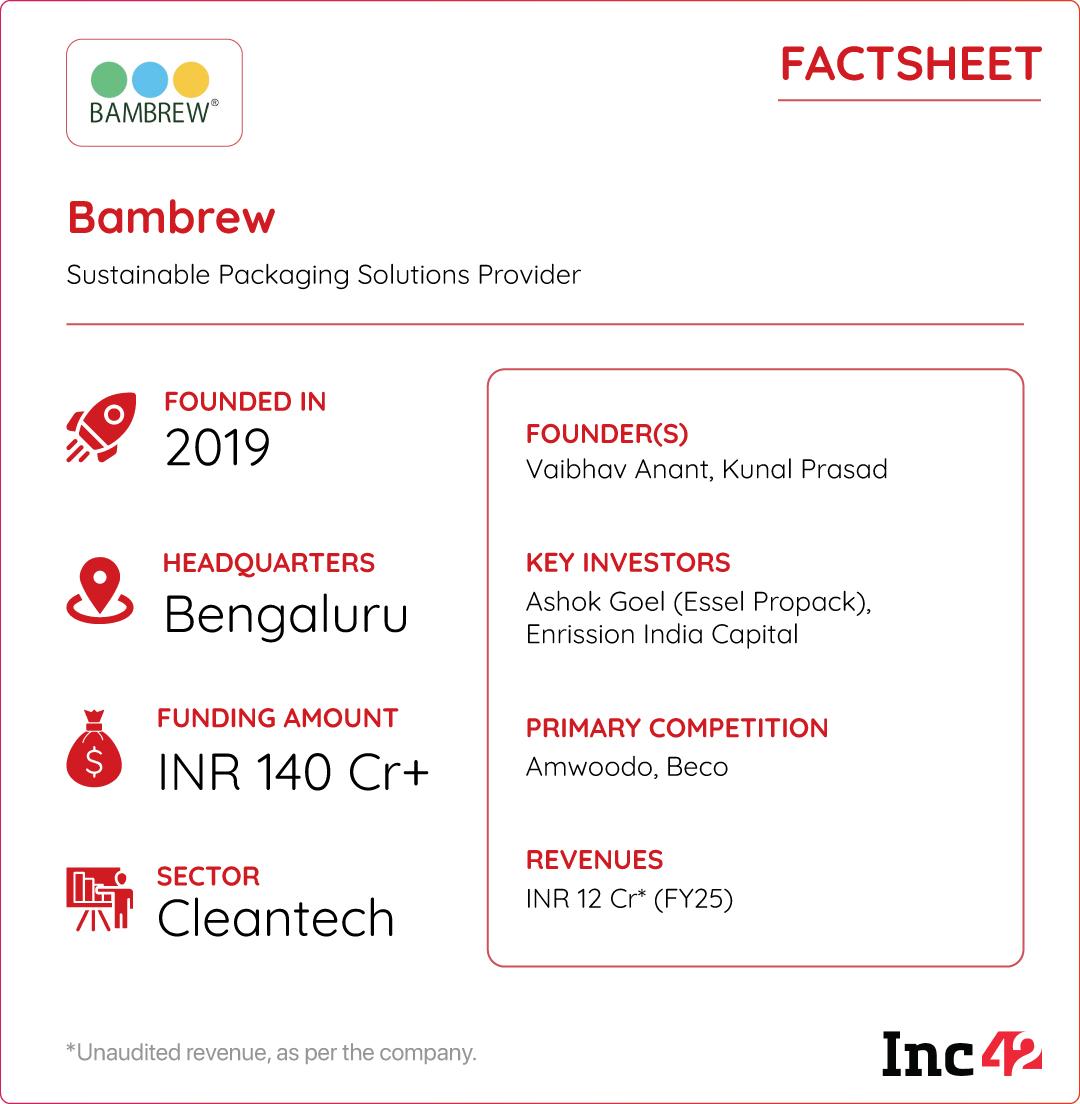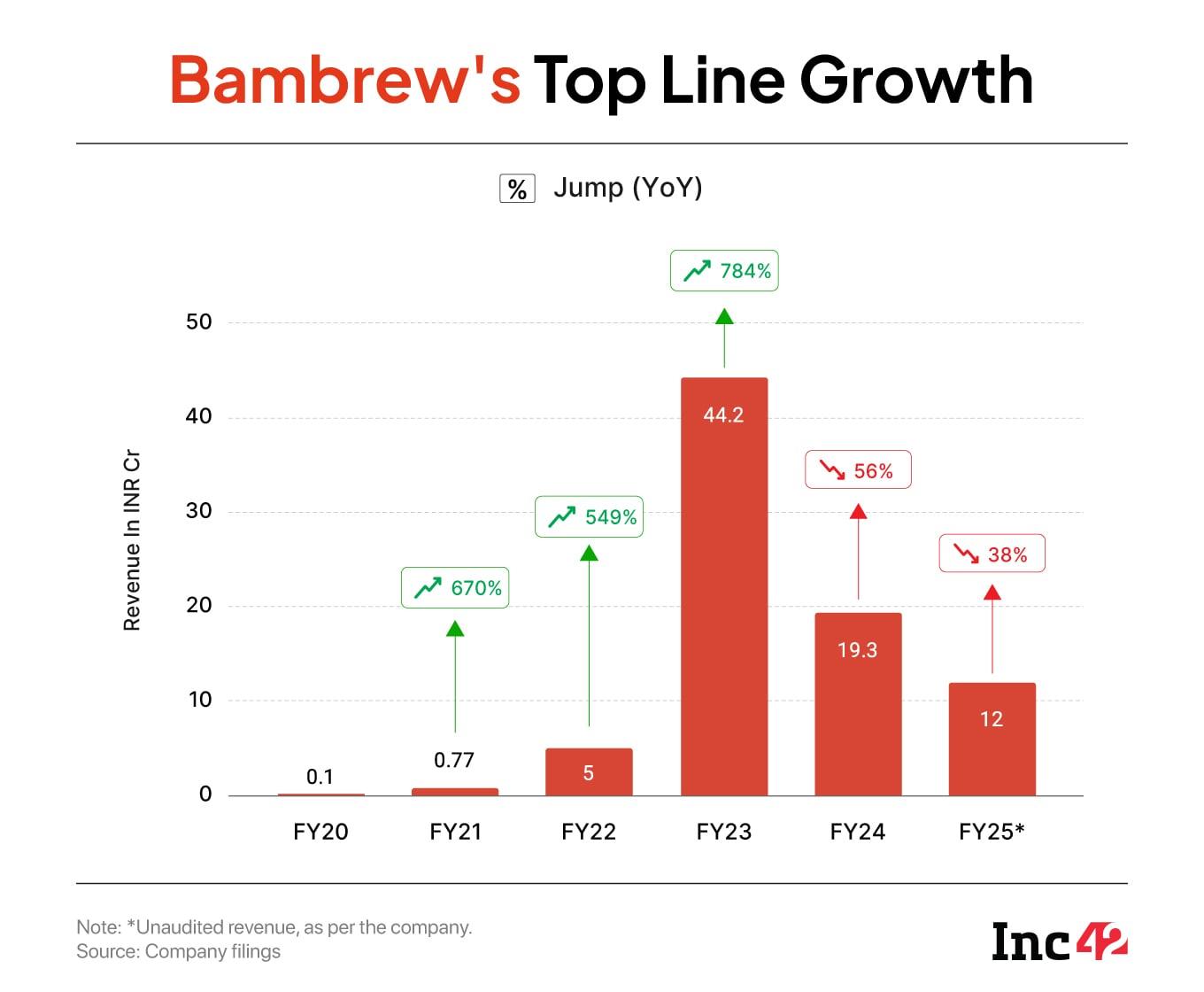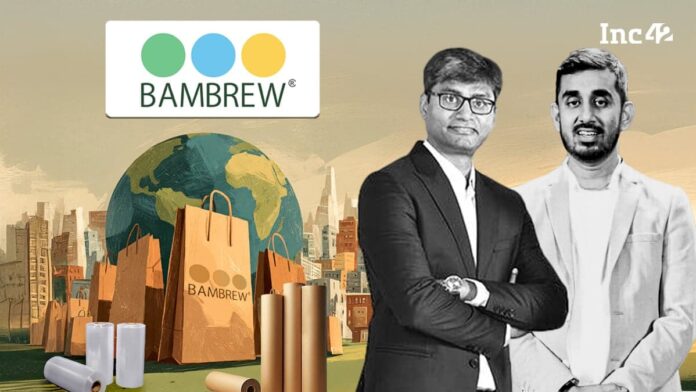If seeking a clean, green world is not asking for the moon, then why not take a moonshot to break the stranglehold of plastic on packaging?
Cleantech startups spotted gold in green and set a $9.67 Bn market for sustainable packaging on a 6.4% annual growth trajectory to reach $19.19 Bn by 2035. In India, the market stood at $9 Bn in 2024 and is estimated to hit $57.2 Bn in 2033, growing 22.5% per year.
As the rapidly growing market fosters an increasing demand for eco-friendly alternatives for single-use plastic, Vaibhav Anant and Kunal Prasad saw immense potential in bamboo. And, Bambrew came up in 2019. “We have so far produced over 250 Mn units of sustainable alternatives to single-use plastic,” claimed Anant.
The Bengaluru-based deeptech metamaterial innovation startup makes biodegradable, environment-friendly and animal-friendly packaging solutions.
“We always wanted to build something that creates real change at scale. Single-use plastic is a massive problem, and we saw an opportunity to solve it while also creating wealth for those building along with us. It’s a space with both purpose and huge potential,” he shared.
India produced 5.46 Mn tonnes of sustainable packaging material in 2022 and a thriving ecommerce and quick commerce market is likely to push it to 8.22 Mn tonnes per year by 2028 at a 7.36% growth rate.
To leverage this surge, the startup has partnered with some of India’s biggest brands from FMCG, ecommerce, and food and beverages sectors, including Amazon, Myntra, Flipkart, Nykaa, Bata, Snitch, Harris Brushes, and Mahindra. Today, it enjoys a network of more than 100 customers with an extended list of over 500 brands that include early- or mid-stage companies and small businesses like retail stores or the HoReCa segment.
The company claims that its solutions are not just eco-conscious, they are also scalable and cost-effective, holding potential to transform the packaging landscape across industries.
Bambrew’s solutions to single-use plastic has attracted investor interest, channelling over INR 140 Cr (around $16.3 Mn) in equity funding and INR 18 Cr (around $2 Mn) in debt, according to Anant. The startup is valued at INR 230 Cr (around $27 Mn).

In its latest Series B funding round, Bambrew raised INR 90 Cr on July 1 from a clutch of investors, led by former Essel Propack managing director Ashok Goel and Japanese venture capital firm Enrission India Capital, through an all-equity deal. Goel now holds a majority stake in Bambrew.
With this fresh infusion of capital, the company is set to ramp up innovation, strengthen its manufacturing infrastructure, diversify product offerings, and expand globally, starting with the Middle East and North America.
A Straw Strikes A Chord, An Idea Is Born
Anant was introduced to bamboo straws by a close acquaintance around mid-2018, when the former employee of Future Group and early-stage startups like Leverage Edu and BAKUBAKU was well into his entrepreneurial journey with RestroShop. The B2B procurement platform was a one-stop solution for restaurateurs, offering everything from fresh produce to packaging supplies.
By July 2018, Anant began exploring the concept of bamboo straws more seriously, starting from the forests of Meghalaya and Assam, where bamboo grows in abundance. The RestroShop experience taught him about supply chains, vendor relationships and, more importantly, the grit required to build something from the ground up. “I wanted to create something more meaningful, an opportunity, to be precise, to create an impact at scale and improve lives,” he said.
As the seeds of an idea started germinating, the world was struck by the COVID pandemic, setting the entire planet reeling under a fear of contamination. “No one was using straws anymore. The entire market collapsed overnight,” he recounted. Instead of giving up, Anant thought of something bigger. He got the whiff of an opportunity far beyond bamboo. “Sustainable packaging was a much larger industry, still waiting to be truly disrupted.”
Prasad, his childhood friend, joined the mission. He came on board not just as a cofounder, but also as one of the early investors, setting the ball rolling for Bambrew.
Over the last six years, the cleantech startup has evolved into a full-stack sustainable packaging solutions provider, offering a line of biodegradable, compostable, and recyclable products made from bamboo, bagasse, seaweeds, and various natural fibres.
Bambrew functions both as a supplier and a manufacturer, working across the entire lifecycle – from plant-fibre sourcing and R&D to manufacturing and distribution – with a portfolio of mailer bags, carry bags, trays, containers, paper tapes, and several other products made of 100% plastic-free materials.
“We have so far saved 60,000 tonnes of single-use plastic, 125,000 tonnes of carbon dioxide, 4.3 Mn kWh of electricity, 115,000 barrels of oil, and more than 3 Mn trees,” Bambrew claims in its website.
A Material-Agnostic Approach To Be Different
Bambrew has positioned itself as a material manufacturing or metamaterial company that develops alternatives to conventional plastic. Once these materials are developed, they are converted into finished products and supplied directly to businesses.
While similar startups like Amwoodo and Beco focus mainly on bamboo-based consumer products, such as toothbrushes, combs, and tissues, Bambrew differs by being material-agnostic, not limiting its raw materials to bamboo. It uses various biodegradable products of natural origin to produce versatile alternatives to single-use plastic. “We work with anything that’s sustainable, scalable, functional, and cost-efficient,” Anant said.
The company follows a four-point strategy when it comes to material selection. Every raw material used must be sustainable, scalable, functional, and cost-efficient. According to the founder, in the beginning, it had to handle the entire process end-to-end to prove the product-market fit. The startup created the final products themselves and deployed them with large brands first.
This helped build credibility and encouraged wider adoption. Its first client was Myntra, while Amazon, Flipkart, and several others joined in later on.
Anant added that smaller, aspiring brands began adopting the solutions after seeing these big names onboard. Although the company’s primary goal, according to the founder, is to reach smaller brands at scale, it is expanding its product range to enter the D2C space. D2C will mark a strategic shift for Bambrew – from a B2B-focussed manufacturer to a consumer-facing brand – bringing its material innovations directly into the hands of environmentally conscious consumers.
Bambrew generates revenue through a straightforward B2B model by manufacturing and selling biodegradable, compostable, and recyclable packaging products to major sectors such as FMCG, ecommerce, quick commerce, agriculture, and manufacturing. Its long-term goal is to transition into a pure-play material technology company, supplying sustainable laminates and base materials to converters.
Its most widely deployed product is mailer bags, which have become a standard replacement for plastic courier bags across major Indian ecommerce platforms, added the founder.
In addition to mailer bags, Bambrew is also working on sustainable garment sleeves (used in manufacturing units), biodegradable D2C products like pet poop bags, feminine hygiene care bags, and food-grade packaging for the F&B industry. It also caters to the pharmaceutical and agricultural sectors. Its unbleached, plastic-free paper cups, capable of holding liquids without a plastic lining, are in commercial use.
Push To Manufacturing Along The Way Ahead
Bambrew is actively replacing single-use plastic across key consumer and industrial touchpoints from logistics to daily utility products.
Its in-house manufacturing facility in Bengaluru operates eight machines capable of supporting a monthly business of up to INR 15 Cr, primarily focussed on ecommerce mailer bags. In fact, Bambrew is one of the largest manufacturers of mailer bags for ecommerce in India today, claimed the founder.
The company is now set for its next big leap and aims to scale up its manufacturing and R&D capabilities, especially around its proprietary biodegradable films. “We’ve developed unique biophil that function like plastic but are fully compostable. These will be used to create pouches for FMCG brands, garbage bags, garment bags, and more,” Anant said.
With the latest funding round, the company aims to invest in importing high-precision, high-cost machinery, some of which costs a couple of million dollars per unit, according to the founder. Certain products like compostable cups are manufactured externally, while some machines are sourced from Germany. “Because of ongoing quality and delivery challenges, we’re now moving these processes in-house.”
The company is funding this shift from its steady growth in business. Driven by deeper client partnerships and an expanding product range, Bambrew recorded a 55% on-year growth till FY23, which it ended with a loss of INR 18 Cr. Most of its expenses were attributed to raw material consumption and changes in the inventory of finished goods. A year later, its revenue reached INR 19.3 Cr with losses down to INR 17 Cr, driven largely by investment-heavy operations around R&D and material development.

“A significant part of our expenditure goes into procuring raw materials for research trials, which often require multiple iterations and naturally lead to high material wastage. That’s why you’ll notice substantial fluctuations in inventory and consumption in our financials. It’s essential, however, to clarify that we maintain a lean operational setup. The burn is almost entirely driven by R&D, not by inefficiencies in operations.”
Anant told Inc42 that FY25 saw notable improvement in the bottomline. The company closed with a revenue of INR 12 Cr and narrowed its losses to the same amount. The financials are yet to be audited.
“The revenue dipped as we diverted most of our resources into manufacturing and R&D. Even this year, we’ll continue to focus heavily on that,” Anant said.
“With better material handling, process optimisation, and stronger vendor relationships, we were able to bring the costs down significantly. That’s why, even with lower revenues in FY24, we saw a meaningful improvement in our net margins.”
Despite the financial struggles, Bambrew is bullish on its long-term vision. The founder is confident that the company will see a significant spike in revenue after the July 1 funding round and sets an ambitious goal of turning Bambrew into a $5 Bn brand over the next five years, when the entire manufacturing and R&D process will be in-house.
For the short term, the Bambrew founder is aiming for a revenue milestone of INR 120 Cr and achieve profitability within the next 12 months. The company plans to diversify its product portfolio to tap into the $5 Bn quick commerce market that is likely to unfold a $40 Bn opportunity by 2030, and a $33.08 Bn beauty and personal care market, with focus on performance-grade packaging solutions that are both compostable and recyclable.
Bambrew is now looking to double down on R&D and product development. It is also building in-house capabilities across technology, manufacturing, and design, aimed at improving product quality, turnaround speed, and customer experience.
[Edited by Kumar Chatterjee]



